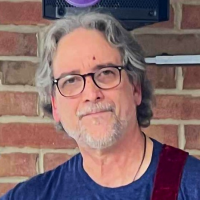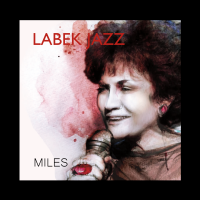Home » Jazz Articles » Interview » Chris McQueen: Snarky Guitars, Part 3
Chris McQueen: Snarky Guitars, Part 3
CM: Some. Private lessons mostly and clinics.
AAJ: So what do you say to these kids who want to do this for a living?
CM: That's a really good question because when we first started doing clinics, it was still the "good old days" of ITunes. Before Spotify, there was a time when you could sell your music digitally and make seven dollars on an album sale, seventy cents on a song. That was doable. Only a few years later, all that changed. We'd do these clinics in front of a roomful of kids. Sure they would wonder if they could make a living in music and at that time, I felt totally fine telling kids, "Don't worry, if you work really hard, it's going to work out for you." There's been a few lately where I was about to say it but thought, "Do I really want to say that?" I actually don't know for sure that it's true anymore.
What I do think is true is that there is always going to be some way to make it work. If music or the arts are really your thing, you are always going to make it work, because you have to. It's definitely different now though. I teach some, I do a lot of arranging. I arrange for a string quartet out of Houston on a regular basis and a lot of horn and string arrangements for church groups. I also just do a lot of gigs. When I'm on the road, at this point the bands I play with pay decently enough. When I'm home, it's basically it's a combination of as many things as I can think of to make it work.
There are some people who have figured out a way to make this new economy work really well for them. Some people make vlogs and have subscription services with access to instructional videos and one-on-one online tutoring and the like. That's awesome but it's a ton of non- musical work and I think you have to have the right kind of personality to make that work. It's great if you can do that but it suffices to say the way we make money will always be changing.
There's kind of a little bit of weirdness right now in that the way you make money [as a musician] is basically decided by four people -the head of Youtube, the head of Facebook, the head of Instagram and the head of Spotify. A lot of people make their money as Youtubers and that's fine but if that is your main source of income, you just have to hope that they don't just one day decide to change their payment system. You're rolling the dice on that. Then again, maybe that's not so different for years ago having a recording contract and hoping the label won't screw you over. Maybe it's just that the people in charge have changed and the things you have to do have changed.
AAJ: Well, knowing that the average musician these days is exponentially busier with all these extra things to make it all work, do you have any time to sit and listen to music anymore?
CM: I don't listen to that much because I find when I do, unfortunately I can't really do anything else. That's a shame because I think that's actually really important and it would be good to prioritize that more. The little time I do listen I find to be gratifying and inspirational. I'm also the kind of listener that when I find something, I'll listen to it over and over. Then I won't listen to music for like a week. It's insane.
AAJ: So the fourth annual GroundUp Music Festival in 2020 is happening soon. Since Snarky Puppy is the host band, do you feel a personal connection to the festival? Part ownership if you will?
CM: I can't really claim to much ownership because I don't put nearly as much blood, sweat and tears into it as Mike and the people behind the scenes do. I play in different settings and I'll do clinics and some extracurriculars. They work their asses off and never sleep but I do represent it and I'm proud of it for sure. Comparing it to other festivals, I think it's really cool. I like that it's only two stages and that way if you come in the afternoon and just hang out, you're going to see everything. It's so much more chill. Most of the artists are the type that are going to walk around and they want to see the other bands too. There really isn't a whole lot of VIP area so the artists pretty much go and hang out with the people. Everyone seems cool with that. That feels pretty unique compared to other festivals that I've been to.
AAJ: I understand FORQ will be playing GUM Fest as well. I also understand that FORQ will be touring a lot more since Michael League left. Do you want to talk about the other effects his departure has had on the band?
CM: Sure. Mike not being in the band essentially means we can actually be a band. He was just so busy we could have only done a handful of dates a year. It was just impossible for him to set aside enough time to do it. Now we can at least tour enough to keep active, support our albums and maintain a social media presence.
AAJ: How have the internal dynamics of the band changed?
CM: The idea of the band has always been for everyone to be collaborative as much as possible. When Mike was around, he and I got together and wrote a couple songs for the album Batch ( GroundUp, 2015), but even for the next album Threq (GroundUp 2017) he was a little distracted and not involved. So even then it was more me, Henry and Jason “JT” Thomaspushing it forward. Now that Kevin Scott is in, it's much more of a total collaborative effort again. Kevin and JT both brought in material. Henry and I have both tried to make this the thing we're going to think about every day and work on.
With Kevin being in FORQ now, I think the band is starting to develop more of its own style, sound and look. When Mike was in the band, he's kind of a natural leader and even though he may not have meant to, it was sort of inevitable for him to assume that role somewhat. Even the fonts, looks of the albums and promotion that would happen made it feel like it was more of a Snarky Puppy-like thing. So as frustrating as it might be, it's not surprising to me at all that someone might have mistaken us for a Snarky Puppy side project.
Now, with Kevin in the band and coming from a totally different place, we're able to make it more our own thing, with an independent identity from Snarky Puppy. It's tough from a marketing and booking perspective and it's the kind of thing that Cory Henry has been dealing with too. Once you get branded as something, you really have to fight uphill for a long time to convince people otherwise. People's attention spans are short, so they use it as a kind of shorthand.
AAJ: You're referring to being branded as a Snarky Puppy related project?
CM: Yes. And it's just faster and easier for bookers and promoters, trying to figure out how they won't lose their asses and get people to come out, to just put Snarky Puppy in the title somewhere. At first, sometimes you want that but you also don't want to grab onto that forever or you'll never develop your own personality. It takes a while to convince people you're an entity in and of itself that they should care about. We're working on that and I think that the new album hopefully has a different enough vibe that it feels like it doesn't belong in that [Snarky Puppy] world anyway.
AAJ: Well Four certainly projects the impression that FORQ has become a lot more of a cohesive entity.
CM: That's good. The last couple of albums we've been trying to figure out what this band is really trying to sound like and I think we've started to understand what that is. Our shorthand for that is [to be] weird, but that doesn't really describe anything. There is so much instrumental jazz / fusion out there that the four of us are very aware of trying not to sound like like any of it. Basically we just try to make music that we would want to listen to and we try to keep it as direct as possible. It's too easy to add complication into things. I think we also like to grab for surprising things. Like on our previous album, I wrote this song called "Cowabunghole." I was thinking about what FORQ might sound like doing a surf tune... (pause)
I think this kind of ties into what we were talking about before in terms of my influences and what kind of player I am. I think my main thing is that I always want to be surprising to the active listener. I don't want to play anything you've heard before. And that goes for writing songs for FORQ too. I just want it to be memorable, surprising and something you haven't heard before. That seems to be an overarching, guiding force.
AAJ: That's the kind of thing that really shows in something like your soloing on "Lullabye." Not only do you opt for guitar tones that are off the beaten path, but your spend the majority of that solo "teetering on the edge," so to speak. In many ways, it's a much more interesting place to go than the player that just fires off perfect licks.
CM: I think that's a conscious choice. In some ways, I feel like I never really got good at playing just solid, fucking guitar... (laughs). To me, someone like Mark Lettieri... just give him a guitar and he will sound good. Or someone like Isaiah Sharkey... there will never be a question of where it is going or what's happening. Maybe it's just having too many interests but I never got super good at nailing everything, all the time. I think what I do rely on is inspiration and being in the moment—finding melodies and rhythms that I want to express. The good part is that when I do it right, it feels honest and new. Sometimes it's dangerous because you are skating on the edge of the whole thing falling apart but I basically decided that I'm ok with that.
My favorite musicians are the ones who sound like they're almost not making it at times. Like Tony Scherr. So often he does things that are like, "Is he gonna land this?" but he always does. Always landing things is important and should not be understated. Also guys like Frisell or even Miles Davis, who don't have the greatest "notey" ability, but are so awesome for what they do with what they have.
AAJ: So what do you look forward to doing in the future?
CM: I feel really good about all of the things that I'm doing now. I treasure playing with the musicians that I get to play with. I really like arranging, especially for string quartet. That's totally different from anything else I've done. I've been dipping my toe back into classical music and learning how that works. My main thing is to look for new inspiration and bring that to the projects and bands that I'm in. That keeps it from getting stale. And one of these days I'll have a solo album. No one may care (laughs) but I'll feel like I did it, finally.
AAJ: Well that will be something to look forward to. Thanks for taking the time today, Chris.
CM: Sure and thank you.
Tags
Interviews
Chris McQueen
Mike Jacobs
Snarky Puppy
Bokanté
Matt Read
FORQ
Michael League
Robert "Sput" Searight
Larnell Lewis
pat metheny
Roy Hargrove
Bob Lanzetti
Mark Lettieri
Erykah Badu
John Scofield
Jim Hall
Bill Frisell
Miles Davis
Henry Hey
Jason JT Thomas
Kevin Scott
Cory Henry
Tony Scherr
PREVIOUS / NEXT
Support All About Jazz
 All About Jazz has been a pillar of jazz since 1995, championing it as an art form and, more importantly, supporting the musicians who make it. Our enduring commitment has made "AAJ" one of the most culturally important websites of its kind, read by hundreds of thousands of fans, musicians and industry figures every month.
All About Jazz has been a pillar of jazz since 1995, championing it as an art form and, more importantly, supporting the musicians who make it. Our enduring commitment has made "AAJ" one of the most culturally important websites of its kind, read by hundreds of thousands of fans, musicians and industry figures every month.






















